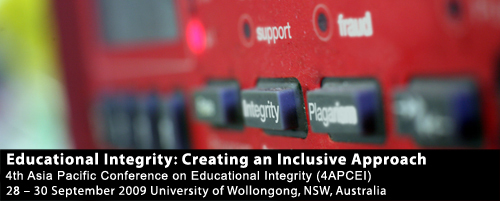Location
41.104
Start Date
30-9-2009 11:30 AM
End Date
30-9-2009 12:00 PM
Description
Training students on the interpretation of originality reports generated by an electronic evaluation tool can assist with the reduction of unintentional plagiarism. An initial trial by the Sydney Business School, a postgraduate faculty of the University of Wollongong, has demonstrated that a proactive approach, based on pedagogical principles, can have a positive impact on the improvement of student writing skills when compared to a retributive justice approach reliant on a student’s ability and initiative in accessing internet support resources. This paper argues that higher education should not rely on links to internet based information, policies, and systems, to educate students in highlighting the seriousness and consequences of allegations of plagiarism. The trial at Sydney Business School supplemented the use of an electronic plagiarism detection tool with instructions given by the lecturer, related to the subject assessment tasks, and discussions both on the benefits of using originality reports and how to use these reports effectively to improve students’ writing, thus providing positive motivation and consistent academic support and guidance. This paper proposes that this more proactive ‘informed’ approach can ultimately achieve better results for students, academics, and institutions.
Links are not enough: using originality reports to improve academic standards, compliance and learning outcomes among postgraduate students
41.104
Training students on the interpretation of originality reports generated by an electronic evaluation tool can assist with the reduction of unintentional plagiarism. An initial trial by the Sydney Business School, a postgraduate faculty of the University of Wollongong, has demonstrated that a proactive approach, based on pedagogical principles, can have a positive impact on the improvement of student writing skills when compared to a retributive justice approach reliant on a student’s ability and initiative in accessing internet support resources. This paper argues that higher education should not rely on links to internet based information, policies, and systems, to educate students in highlighting the seriousness and consequences of allegations of plagiarism. The trial at Sydney Business School supplemented the use of an electronic plagiarism detection tool with instructions given by the lecturer, related to the subject assessment tasks, and discussions both on the benefits of using originality reports and how to use these reports effectively to improve students’ writing, thus providing positive motivation and consistent academic support and guidance. This paper proposes that this more proactive ‘informed’ approach can ultimately achieve better results for students, academics, and institutions.


